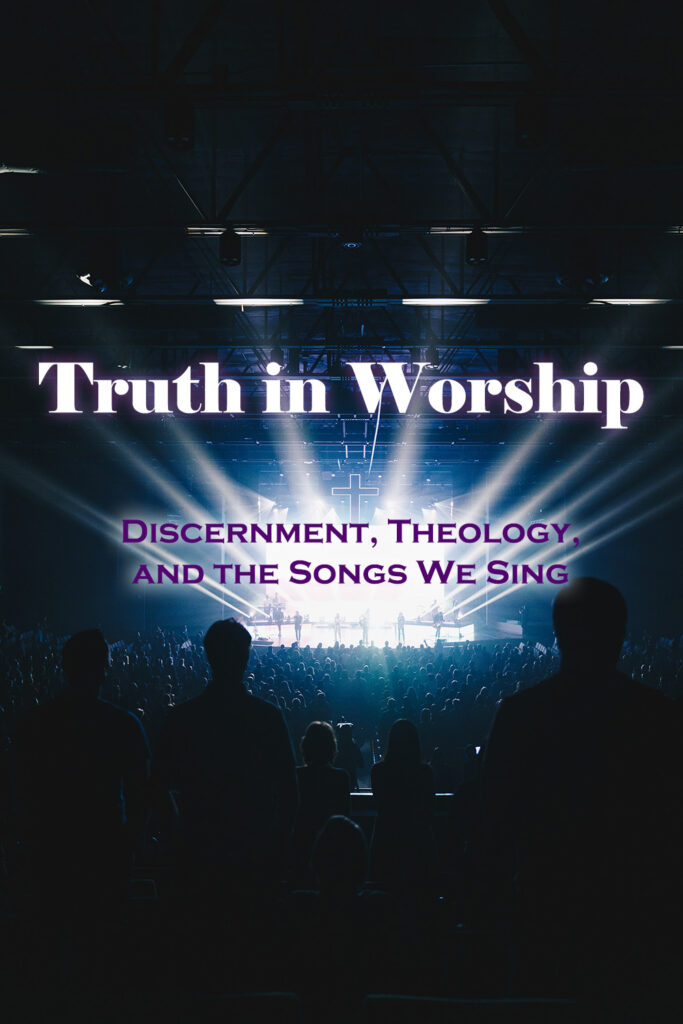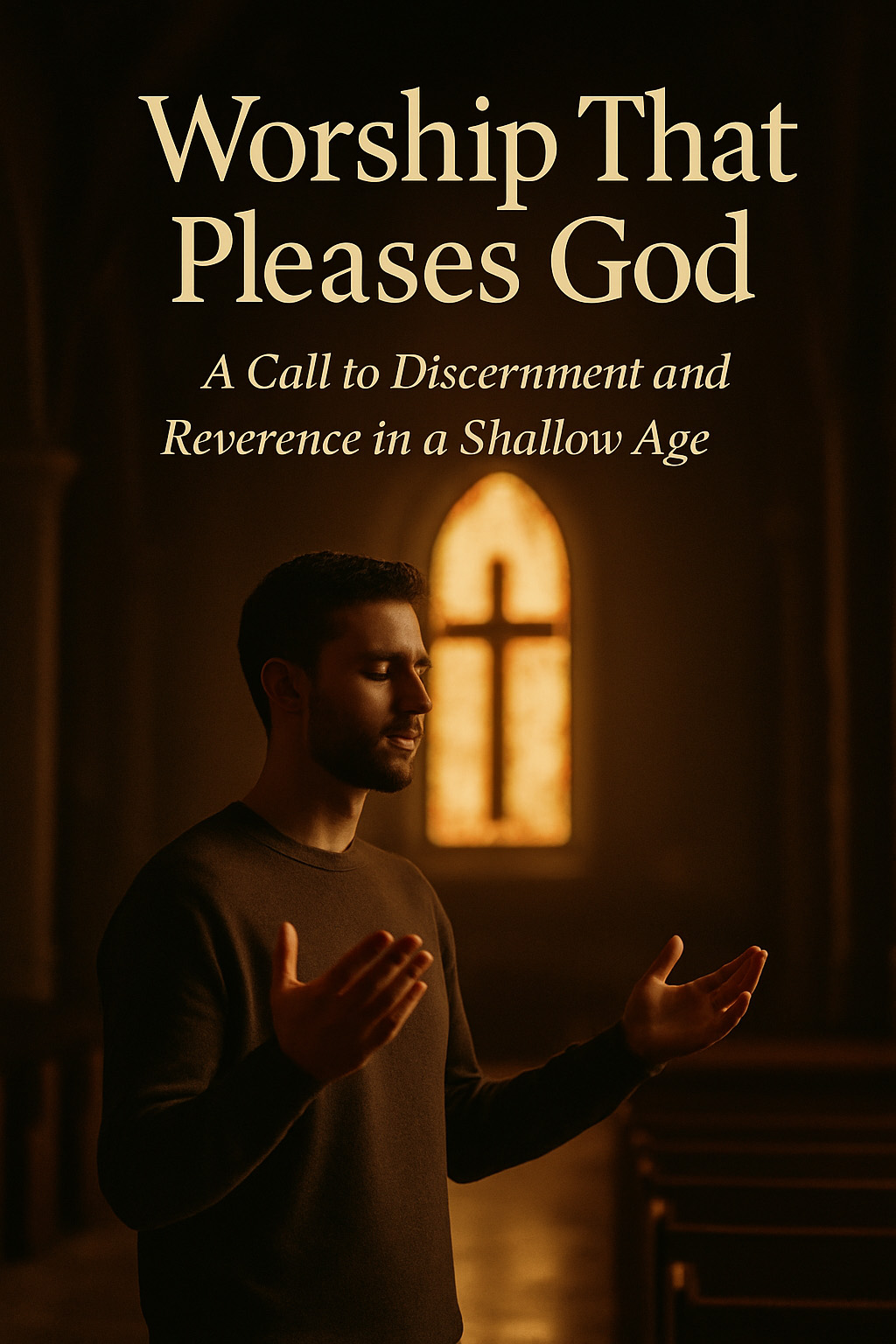⏱️ Estimated Reading Time: 6 min read
Worship That Pleases God
A Call to Discernment and Reverence in a Shallow Age of Worship
By Drew Von Neida
In recent years, worship in many churches has started to look and feel a lot like the surrounding culture: loud, emotionally charged, experience-driven, and centered more on personal feelings than on biblical truth. Worship sets resemble concerts. Lyrics sound more like self-help mantras. And behind the music, ministries like Bethel Music, Elevation Worship, and Maverick City are shaping the sound of the modern church, and not because of theological integrity, but because of emotional appeal and mainstream success.
But for Christians who love Christ and His Word, this trend raises a vital question:
Are we offering worship that pleases people, or worship that pleases God?
The Regulative Principle: Worship on God’s Terms
At the heart of this conversation is something called the regulative principle of worship. Simply put, it’s the belief that God—not us—gets to decide how He is to be worshiped. We are not free to create, customize, or borrow from culture. Worship must be grounded in Scripture, shaped by God’s commands, and offered with reverence.
This principle stands in contrast to the normative approach, which assumes we can do anything in worship unless Scripture explicitly forbids it. But God’s Word warns us against this thinking:
- Leviticus 10:1–2 – Nadab and Abihu offered unauthorized fire before the Lord and were consumed.
- Deuteronomy 12:32 – “Everything that I command you, you shall be careful to do. You shall not add to it or take from it.”
- John 4:24 – “God is spirit, and those who worship Him must worship in spirit and truth.”
- Hebrews 12:28–29 – “Let us offer to God acceptable worship, with reverence and awe, for our God is a consuming fire.”
These verses remind us that worship is not a sandbox for creativity or a platform for performance. It’s a sacred act—one that must be offered with fear, faith, and fidelity to God’s Word.
What’s the Problem with Bethel, Elevation, and Others?
Some push back: “But the music is beautiful,” or “People are coming to Christ through these songs.” That may be true in part, but beauty and impact do not equal truth. Worship must be measured not by how it makes us feel, but by whether it aligns with Scripture and reflects the character of God.
Here are three concerns with these popular ministries:
- Their Theology Undermines the Gospel
Bethel Church promotes grave soaking, unbiblical declarations of healing, and a distorted view of Christ’s divinity. Elevation Church, under Steven Furtick, preaches a man-centered message that often presents God as a tool for personal breakthroughs rather than the holy Lord of all.
When churches sing songs from these ministries, they are not just borrowing lyrics—they are promoting the platform and theology behind them. Licensing fees support their work. Lyrics give them credibility. And the damage is often done subtly, without a word being spoken.
As Paul warned in Galatians 1:6–9, to promote a different gospel, even unintentionally, is no small thing.
- Their Worship Is Centered on Self, Not God
Much of modern worship revolves around personal emotion and experience. Lyrics emphasize my worship, my breakthrough, my miracle, my victory. The focus drifts from the glory of God to the feelings of the individual.
This stands in stark contrast to the Psalms and the worship scenes in Revelation, where the emphasis is on God’s majesty, faithfulness, and holiness. True worship exalts the Lord, recounts His works, and brings the worshiper low in awe and wonder.
- They Blur the Line Between the Sacred and the Profane
Stage lights, choreographed crescendos, and emotionally driven atmospheres often create a setting that feels more like a concert than a church. The result? Emotion without substance. Excitement without transformation.
Worship that is driven by atmosphere rather than truth may stir the senses but leave the soul untouched.
What True Worship Looks Like
So, what does the Bible say true worship is? Here are four clear marks drawn from Scripture:
- Worship Is Regulated by God’s Word
God has not left us to guess. He has told us how to worship Him—through prayer, preaching, the reading of Scripture, singing psalms and hymns, the ordinances, and gathered fellowship. (See Colossians 3:16; Acts 2:42.)
- Worship Is Reverent
Hebrews 12 reminds us we come before a consuming fire. Worship is not meant to entertain—it’s meant to humble us in the presence of God’s holiness.
- Worship Is Rooted in Truth
Jesus said we must worship “in spirit and truth” (John 4:24). That means both heartfelt devotion and doctrinal soundness. Our songs should teach, not just inspire.
- Worship Is Christ-Centered and Church-Edifying
Worship is not a personal concert. It’s a corporate act of praise that lifts high the name of Jesus and builds up the body of believers.
A Gentle but Urgent Plea
To those who love the music of Bethel, Elevation, or Maverick City: this isn’t an attack on your sincerity. Your desire to worship God is real, but that desire must be shaped by truth.
We wouldn’t sit under false teaching week after week. So why would we allow our songs, affections, and theology to be formed by the same ministries?
Churches must lovingly but firmly stop using music that comes from movements that distort the gospel. It is not enough for a song to “feel good” or “sound Christian.” We must ask: Is this true? Does this honor God? Is this shaped by His Word?
Worship Is Holy
Worship belongs to God. It’s not for us to redefine or repurpose. It’s not a tool to draw crowds or manipulate emotions. It is holy ground, and we should treat it that way.
Let’s return to the beauty of simplicity. Let’s sing songs shaped by Scripture, grounded in doctrine, and offered from hearts that tremble at His Word.
Colossians 3:16, “Let the word of Christ dwell in you richly… singing psalms and hymns and spiritual songs, with thankfulness in your hearts to God.”
- Let’s feed the sheep, not entertain the goats.
- Let’s exalt Christ, not mimic the culture.
- Let our worship be holy.

Truth in Worship: Discernment, Theology, and the Songs We Sing
Drew is a regular writer at Servants of Grace and is a regular contributor to the Warriors of Grace podcast. He holds a Bachelor of Science in theological and biblical studies and a Master of Arts in Biblical exposition, both from Liberty University. He lives in Taylorsville, Georgia with his wife Brandy and their three children.




